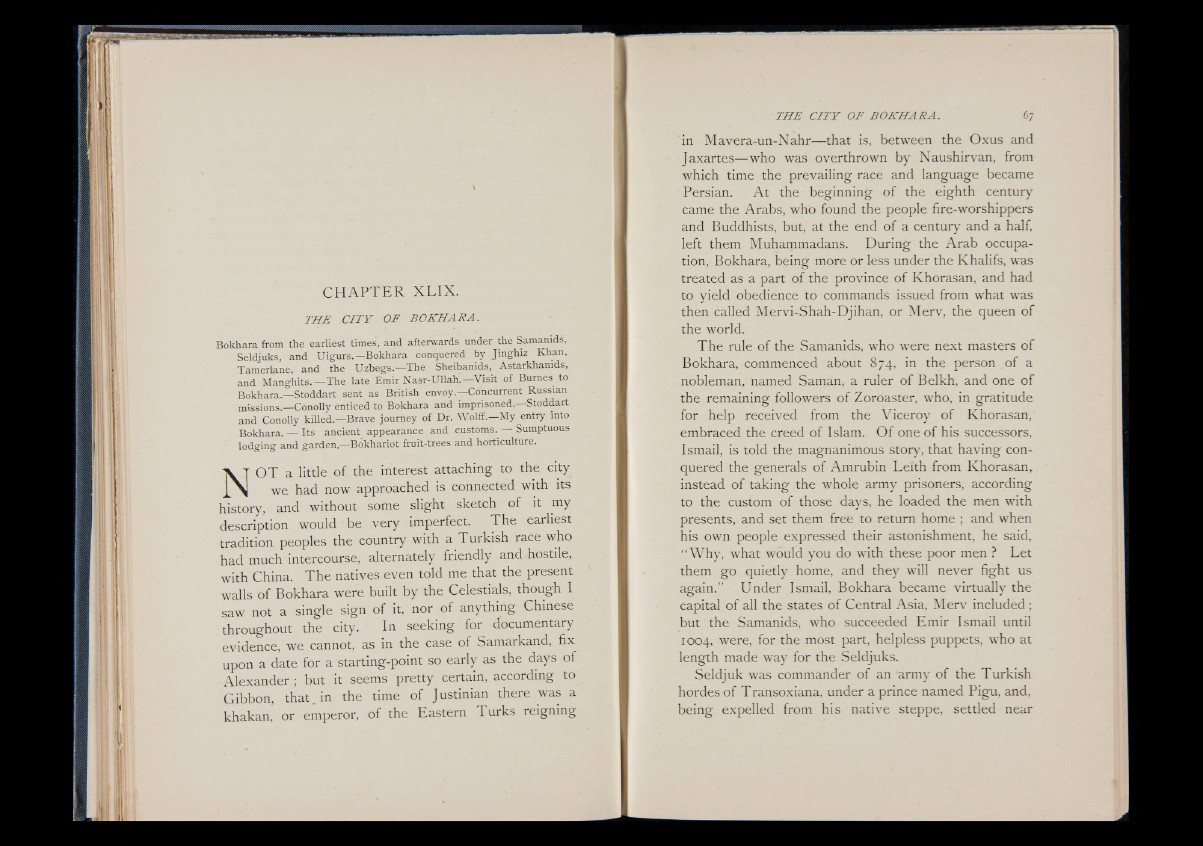
C H A P T E R XLIX.
THE C IT Y OF BO KH A R A .
Bokhara from the earliest times', and afterwards under the Samanids,
Seldjuks, and Uigurs.—Bokhara conquered by Jinghiz Khan,
Tamerlane, and the Uzbegs.—The Sheibanids, Astarkhanids,
and Manghits.— The late Emir Nasr-UUah.—Visit of Bumes to
Bokhara.— Stoddart sent as British envoy.—Concurrent Russian
missions.— Conolly enticed to Bokhara and imprisoned.— Stoddart
and Conolly killed—Brave journey of Dr. Wolff.—My entry into
Bokhara. — Its ancient appearance and customs. — Sumptuous
lodging and garden.— Bokhariot fruit-trees and horticulture.
NO T a little of the interest attaching to the city
we had now approached is connected with its
history, and without some slight sketch of it my
description would be very imperfect. T he earliest
tradition peoples the country with a Turkish race who
had much intercourse, alternately friendly and hostile,
with China. T h e natives even told me that the present
walls of Bokhara were built by the Celestials, though I
saw not a single sign of it, nor of anything Chinese
throughout the city. In seeking for documentary
evidence, we cannot, as in the case of Samarkand, fix
upon a date for a starting-point so early as the days of
Alexander ; but it seems pretty certain, according to
Gibbon, that, in the time of Justinian there was a
khakan, or emperor, of the Eastern Turks reigning
in Mavera-un-Nahr— that is, between the Oxus and
Jaxartes— who was overthrown by Naushirvan, from
which time the prevailing race and language became
Persian. A t the beginning o f the eighth century
came the Arabs, who found the people fire-worshippers
and Buddhists, but, at the end of a century and a half,
left them Muhammadans. During the Arab occupation,
Bokhara, being more or less under the Khalifs, was
treated as a part of the province o f Khorasan, and had
to yield obedience to commands issued from what was
then called Mervi-Shah-Djihan, or Merv, the queen o f
the world.
T h e rule of the Samanids, who were next masters o f
Bokhara, commenced about 874, in the person o f a
nobleman, named Saman, a ruler o f Belkh, and one o f
the remaining followers of Zoroaster, who, in gratitude
for help received from the Viceroy o f Khorasan,
embraced the creed of Islam. O f one o f his successors,
Ismail, is told the magnanimous story, that having conquered
the generals of Amrubin Leith from Khorasan,
instead of taking the whole army prisoners, according
to the custom of those days, he loaded the men with
presents, and set them free to return home ; and when
his own people expressed their astonishment, he said,
“Why, what would you do with these poor men ? Let
them go quietly home, and they will never fight us
again.” Under Ismail, Bokhara became virtually the O ’ J
capital of all the states of Central Asia, Merv included;
but the Samanids, who succeeded Emir Ismail until
1004, were, for the most part, helpless puppets, who at
length made way for the Seldjuks.
Seldjuk was commander of an army of the Turkish
hordes of Transoxiana, under a prince named Pigu, and,
being expelled from his native steppe, settled near